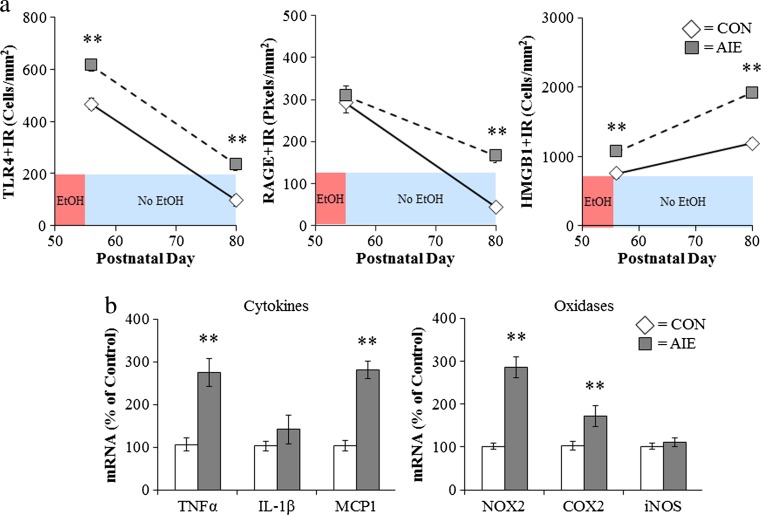Fig. 6.
Adolescent intermittent ethanol (AIE) treatment leads to a persistent induction of neuroimmune genes in the adult brain. a Male Wistar rats were treated with ethanol (5 g/kg/day, i.g., w/v, 2 days on/2 days off) or comparable volumes of water from postnatal day (P)25 to P55. Brain tissue was collected either 24 h (P56) or 25 days after the last ethanol treatment (P80) to assess the persistent expression of neuroimmune markers. Toll-like receptor 4 (TLR4) immunoreactivity was upregulated 24 h after ethanol treatment and remained elevated for 25 days following the conclusion of ethanol treatment. In contrast, there was no change in receptor for advanced glycation end-product (RAGE) expression immediately following the conclusion of ethanol treatment but was elevated 25 days after the conclusion of ethanol treatment. Expression of high-mobility group box 1 (HMGB1), an endogenous TLR4 and RAGE agonist, was increased both 24 h and 25 days following the conclusion of ethanol treatment. b In a separate cohort of subjects, frontal cortex tissue samples were collected from CON- to AIE-treated animals on P80 (25 days following the conclusion of ethanol treatment) and neuroimmune gene mRNA levels were assessed. Adolescent binge ethanol treatment led to long-term upregulation of proinflammatory cytokines (tumor necrosis factor-alpha [TNFα] and monocyte chemotactic protein-1 [MCP-1]) and oxidases (cyclooxygenase [COX-2] and gp91PHOX [NOX2]). **p < 0.01, relative to CONs. Data are adapted from Vetreno and Crews (2012) and Vetreno et al. (2013)

